- Home
- Jean Stone
A Vineyard Summer Page 2
A Vineyard Summer Read online
Page 2
But Donna wasn’t due back until mid-August: far too late for Annie to make a decision.
She wanted to stay on the island, wanted to live and breathe and keep writing there. She also wanted, very badly, to continue her relationship with John, wherever it led. And she wanted to perfect the craft of soap-making that she’d learned from her friend Winnie Lathrop, who was part of the up-island Wampanoag tribe.
But she didn’t suppose she could live in Aquinnah with Winnie and her family, because Annie’s roots were Scottish, not Native American.
She wished she could ask Donna for advice. She also wished she could talk to her adoptive parents, the Suttons, who had known her in a way Donna never could. Annie still found it disturbing to think that a mother did not really know her child.
“It will take time,” Donna had said the day she’d arrived on Chappy after Annie had finally responded to the woman’s letter that began with the powerful words: I am your birth mother. . . .
Donna had stayed with Annie nearly a week, sleeping on an air bed on the living room floor. They’d talked and talked about important things and about nothing special. They’d walked for hours, exploring the dirt roads of the island, getting used to each other’s presence amid the sounds of the waves and the occasional cry of a gull. It had been in January, when most folks had the good sense not to be there. But for Annie, the togetherness had been like a warm quilt.
Annie looked like her, or at least how Annie had looked before she’d traded her designer clothes for jeans and flannel shirts and had stopped having manicures that weren’t conducive to harvesting herbs, plucking wildflowers, and making soap. They had the same dark, almost black, hair that was now streaked with silver, though Donna admitted to having more streaks than her stylist allowed her to show. They had the same long-legged, lean body, the same careful stride, the same happy laugh. The same hazel, not green, eyes.
Mother and daughter. The tree and the apple.
Donna had promised to return after the cruise; they’d agreed that the Vineyard would be a wonderful place to cement their new bond. Which was one more reason it was imperative that Annie found a damn place to live.
There was always Kevin, she supposed. But Annie was still getting used to the idea that her birth mother was in her life, let alone that Annie had a half brother who was nine years younger than she was. She’d met Kevin only once—over lunch, in Boston—when he’d joined her birthday celebration with Donna. She’d told Annie that he’d recently sold his construction business and, like her, he was single again.
“I spent all of an hour with him,” Annie now said to herself with a small laugh. “It might be a bit presumptuous to ask if I could move in for a while.”
Still, she had his phone number.
She could always send a friendly text.
If she knew what to say.
Or how she thought he could help.
She punched her pillow to rearrange the fluff, then snapped off the light again. Tomorrow, she thought. I’ll think about it tomorrow.
Or the day after.
Then she closed her eyes again and prayed that sleep would come quickly.
Chapter 2
The following afternoon, Annie stood on the sandy path that led from North Water Street down to the Edgartown lighthouse—officially, the Edgartown Harbor Light. Along the dune grass and rock jetty, beach roses were in full, scenic bloom, a pink-and-white symphony with summer-green leaves against a backdrop of sapphire water and aquamarine sky.
She looked back toward Chappaquiddick, across the channel and the harbor that was sprinkled with the confetti of white-masted sailboats gently bobbing at their moorings. From where she stood, she could see her landlord’s big waterfront house that would soon be filled with God only knew how many wedding guests. Jonas, the budding artist, would no doubt be among them.
She hadn’t heard from John that morning, which wasn’t surprising. He was on the night shift now, twelve hours on, twelve off, to keep the summer as peaceful as the Chamber of Commerce brochures promised. Besides, John knew that Annie needed to write every day in order to meet her deadline. And now she’d have to shorten her work hours to allow time to walk around Edgartown, talk one-on-one with rental agents, and hope they’d put the word out that Annie Sutton needed somewhere to live.
In the evenings, her new plan was to get back to work and edit what she’d written earlier—as if she’d be able to concentrate while her housing issues swirled in her mind the way the winds had swirled outside in winter. She’d hardly have time to see John. She hoped he wouldn’t think she’d lost interest in him, that it was the real reason she’d turned down his offer.
Pulling her gaze off Chappy and the waterfront property that wasn’t hers, she took her cell phone from her purse.
“I know you’re sleeping,” she said when John’s voice mail kicked in. “But I wanted to say I hope things with your daughter have worked out all right. Life can be unpredictable, can’t it? Anyway, I’m thinking of you.” With her last words, a soft ache rose in her heart. “I’m in Edgartown, off to see rental agents. Hope to see you soon.” She quickly pushed the red “End” button, swallowed her emotions, and headed up the path toward the stanchions of historic, white, sea captains’ homes that weren’t hers, either.
The first real estate office was only a block away; a tiny bell jingled over the door as Annie stepped inside.
“Year-round rental?” the young woman at the reception desk asked. She wore a sea-glass necklace and too much eyeliner that was smudged from the warm day. According to the nameplate, she was Hannah Smith.
“I know,” Annie said. “I might as well ask for the moon, right?”
“Or Jupiter. Or Mars.”
Annie dropped onto a chair that no doubt had been strategically placed to combat client exhaustion.
“We had one last week. A one-bedroom right here in the village. Thirty-five hundred a month. We got the listing in the morning, and it was rented by noon.”
Great, Annie thought, knowing that she might have been able to afford it if she hadn’t spent all her money paying off her ex-husband’s debts.
“Are you checking social media?”
“I will. Later today.”
“Put a listing in both newspapers?”
“Not yet.”
“Asked as many people as you know?”
“I’m working on that. I only found out yesterday that I have to leave. What about weekly rentals? Do you have anything from, say, mid-August until I can find a winter rental? Something in a realistic price range?” As much as she didn’t want another temporary fix, one could at least buy her the time to finish her book.
“Depends on what you mean by ‘realistic.’ Even then, most of our properties have been booked solid for months. I can let you know if we have any last-minute cancellations. But we mostly handle four- and five-bedroom homes. Family homes, you know?”
Yes, Annie knew.
“We might get a few year-round ones after Labor Day,” the girl said as Annie stood up and went to the door. “So if you don’t hear from me, stop back then.”
Annie gave her contact information to Hannah. Then she thanked her and went out the door, the little bell tinkling more loudly that time as if to say, “Good luck, you’re going to need it.”
* * *
She walked. She pondered. She tried not to panic, a mind-set that was becoming more challenging with each hour that passed, with each stop she made at rental offices—five in all—where she was given the same advice:
“Leave your contact information.”
“Check back after Labor Day.”
And the most disheartening: “Don’t give up,” which was delivered with a sympathetic smile.
By the time Annie had threaded her way through throngs of sunglassed, flip-flopped men, women, and kids who strolled willy-nilly along Dock Street, her usual optimism that the right attitude and a happy smile could overcome obstacles had vanished like the tourists after Columbus D
ay weekend.
When she reached the ferry, the On Time II—which, along with the On Time III, provided Chappaquiddick’s only public means of conveyance—she squeezed between two day-trippers who were equipped with water bottles, backpacks, and hiking shoes, and sat on one of the small metal benches that hugged the wooden railing on either side. Within moments, the boat chugged away on its 527-foot, ninety-second journey. She didn’t need to see the red, white, and blue buntings that draped Memorial Wharf to be reminded that the Fourth of July was a mere three days away; she only had to look at the three SUVs aboard the On Time that sagged from their cargo of suitcases, coolers, and, no doubt, lots of bug spray, and from the colorful kayaks strapped to the roofs; she only had to gaze at the herd of bicycles on one end of the boat or at the animated faces of the passengers. She wished she could capture even a glimmer of the enthusiasm they were exhibiting.
The On Time inched closer to the tentlike tops of the red-white-and-blue–striped beach club cabanas that garnished Chappy’s shoreline like children’s pinwheels ready to spin into action.
Annie tried to remember what it had felt like the first time she’d come to the Vineyard at ten or eleven, when her parents, Bob and Ellen Sutton, had rented a small cottage for two magical weeks that turned into an annual pilgrimage. The island had been different then, softer, quieter. Annie had loved flying kites, building sandcastles, and riding bikes with her dad up island, past miles of rolling hills, ancient stone walls that framed breezy pastures, and expanses of shoreline that offered postcard kinds of views.
Back then there were few inns and fewer restaurants. Once, when her mom forgot to get corn for dinner, Annie and her dad went to a nearby farm. He’d forgotten his wallet, so they stole six ears right off the stalks; the next day, they went back and paid for what they’d filched. The cottage they’d rented had indoor plumbing but no electricity; at night they ate strawberry shortcake and played Parcheesi and Sorry! by the light of kerosene lanterns. Her dad loved the island. After he was cremated, she and her mother sprinkled his ashes off South Beach as he’d requested.
As much as Annie cherished those vacations with her parents, her favorite Vineyard memory was the year she was fifteen, when she gathered the courage to wear a two-piece bikini and sat on the beach savoring John Irving’s The Hotel New Hampshire, while peering over the arc of her sunglass lenses at the cute boy, a few blankets away.
Years later, the cute boy became her first husband. Most people said it wouldn’t work: Brian’s family, after all, spent all season on the island; they were among the haves. The marriage was filled with love and joy but hadn’t lasted—not for the reasons some had predicted, but because Brian was killed in a car accident when he was twenty-nine.
But, yes, if Annie thought hard enough now, she could remember what it had been like to feel happy.
The On Time bumped the piling on the Chappy side of the pier. She waited for the flip-flops to scurry off, then, as she sauntered down the ramp, she spotted Earl Lyons—John’s father—leaning against the tiny gray-shingled information booth.
“Coffee?” he asked when Annie joined him.
“How’d you know I’d be here?”
In April, Earl had hung up his red-and-black-checked wool shirt for what he called his “seasonal wardrobe,” which that day included a brown T-shirt with the colorful logo of Offshore Ale. Earl wasn’t much of a drinker, but he often said that advertising local establishments was good for the economy. Between the T-shirt, his trademark jeans, and well-worn sneakers, it was hard to believe that, despite a crop of white hair and thick, spiky eyebrows, he was nearly seventy-five.
“I’d like to say my timing is due to my supernatural powers, but it isn’t. I came down to pick up cedar shingles for one of my customers. The lumberyard delivered the boxes to the Edgartown side and shipped them over on the ferry. While I loaded them onto my truck, I saw your car in the lot. Then I stopped to say hello to a neighbor, Charlie Beebe—do you know Charlie?”
Annie shook her head.
“Great guy. Lost his wife a few years back. Anyway, he got off the same boat that the shingles did. By the time he left and I was done loading, along came the next ferry and here you are.” As usual, Earl’s explanation involved a long story, though he always had a way of putting Annie in a good mood: In many ways, he reminded her of her dad.
“Follow me,” she said. “It’s too late in the day for cinnamon rolls, but I might be able to unearth a cookie or two.” When the season had officially started, they’d had to curtail the morning coffee-and-pastry routine that they’d fallen into last fall. Earl said that most things changed in summer because folks didn’t have enough time to breathe. She was beginning to understand what he’d meant.
“I’ll be a few minutes behind you,” he said. “Might as well drop the shingles off on the way.”
Annie waved, went to her car, and drove the short distance to the cottage. Off season, if the weather was decent, she walked, but that day it was too hot and there were too many people and vehicles to enjoy a peaceful stroll.
As a reminder that quiet time had grown rare, when she pulled into her driveway, she saw three delivery trucks parked by the main house, and a crew of ten or twelve men hoisting a white tent on the lawn that led down to the water.
* * *
“Big wedding this week,” she said once Earl arrived and took his usual place at her table. “Roger’s daughter.”
“Dana.”
“So I heard.”
“She was a nice kid. Not phony like her father or too sweet like her mother.”
“You never said you weren’t fond of the Flanagans.” The percolator on the woodstove had done its job; she set it on a cool burner so the grounds could settle.
“Roger could be worse, but it’s always been hard to tell what he’s thinking. His grandparents bought this property before I was born. When Roger inherited it, he renovated the place. I think he likes it here: He supports a few island causes, like the hospital and community services and the garden club that Claire’s in, though I’ve often wondered if he only does it so he can tell folks he does. You know what I mean?”
Annie nodded.
“And then there’s his wife, Nicole. When she sees you she acts like you’re her long-lost best friend. But she’s real good at ignoring you if one of her spa-going lady friends is around, like she doesn’t want to be seen mingling with the locals. She’s been known to grouse—in a real syrupy way—about the fact that there’s no restaurant on Chappy; that there are too many seagulls on their beach; and what a shame it is that there aren’t more tennis courts at the community center. She says all of it with her lips kind of pursed as if she’s not complaining, but I’ve always figured she’d secretly rather be on Nantucket.” His monologue included a few cartoonish gestures and one or two well-practiced eye rolls.
“Then why do they stay?”
“My guess is Roger feels like a big cheese here.With all his money, he’s certainly one of them.”
Money. Annie had never understood why some people embraced it to the point of letting it define their lives.Then again, if she had, she might have never signed the prenup that Brian’s uppity sister had insisted on. Because Annie and Brian had been married only six years when he was killed, Annie had received nothing. There had been no protection against him dying—Brian had been so young, his family had longevity on both sides, and tragedy only happened to other people, didn’t it? After the accident, Annie kept teaching third grade. But on her income alone, she had to move into a smaller apartment, a one-bedroom, no bigger than where she was now.
“Well,” she said, “I won’t need to think about the Flanagans much longer. Have you talked to John?”
“Yup.” Earl plucked a peanut butter cookie from the plate Annie had set out. He took a considered bite, chewed, then swallowed. “What are you going to do?”
She didn’t mind that John had told his father about her housing crisis, though she wondered when he’d found t
he time to call Earl, since she’d assumed he’d been sleeping all day. Not that John had to answer to her.
“I saw some real estate agents today. No luck, though. It’s a terrible time of year to find a year-round rental.”
Earl looked over her shoulder. “That coffee ready yet?”
She filled two mugs and waited for him to say whatever else he wanted to say. She’d known him long enough to tell when he had something on his mind.
“John says you won’t move in with him?”
Annie didn’t know what she’d expected but that was not it. Though Earl probably knew she and John often had dinner together, she’d never let on that it had become real dating, the kind that involved spending time together that often included overnights. Apparently, however, John had.
She set the coffee on the table and sat down. “John is an amazing guy,” she said with a smile. “But I’m still getting my feet on the ground here. Still shaking off the soot from too many years in the city. Do you understand?”
“Nope.” Earl always seemed to have a comeback for which she wasn’t prepared.
“Okay. Then how about this? It’s too soon for me. Moving in with him feels too much like a commitment. I don’t want to make one unless I’m absolutely certain it’s the right thing for me. And that he is absolutely certain it’s right for him, too. In other words, I don’t want to rush into anything just because I’ve been kicked out of my house.”
“Fair enough.” He took a long gulp of coffee.
“Besides,” Annie continued, “I’ve only met his daughters once. And that was for a quick breakfast at Among the Flowers.” She decided not to say she’d felt awkward then, that John had introduced her as an author and that, because his older daughter, Abigail, was a reader, he’d thought the girls would like to meet her. He’d never implied that they were a couple or anything more than mere acquaintances. “Anyway,” Annie added, “I don’t think it would be fair to suddenly move into their father’s house, do you? The girls don’t seem to want to come here as it is. If I was there, it might make things harder for him.”

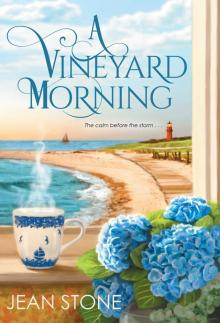 A Vineyard Morning
A Vineyard Morning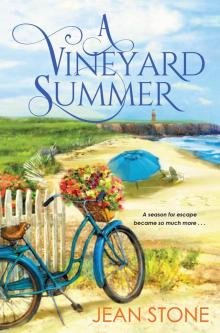 A Vineyard Summer
A Vineyard Summer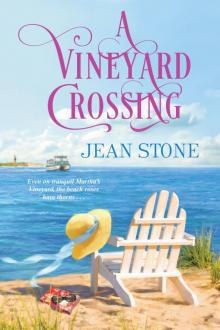 A Vineyard Crossing
A Vineyard Crossing A Vineyard Christmas
A Vineyard Christmas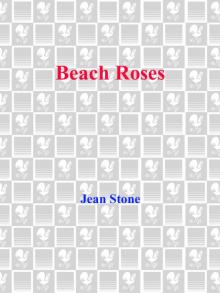 Beach Roses
Beach Roses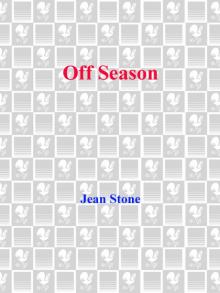 Off Season
Off Season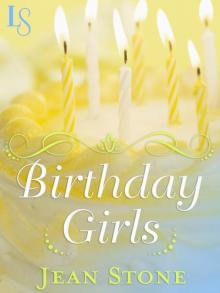 Birthday Girls
Birthday Girls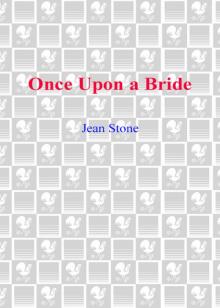 Once Upon a Bride
Once Upon a Bride Places by the Sea
Places by the Sea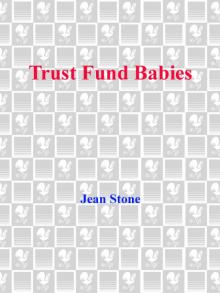 Trust Fund Babies
Trust Fund Babies The Summer House
The Summer House Tides of the Heart
Tides of the Heart Sins of Innocence
Sins of Innocence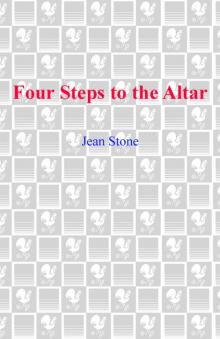 Four Steps to the Altar
Four Steps to the Altar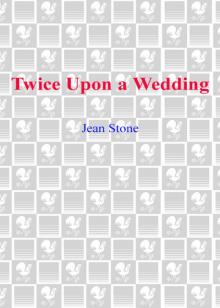 Twice Upon a Wedding
Twice Upon a Wedding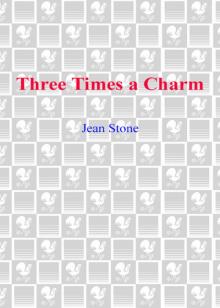 Three Times a Charm
Three Times a Charm